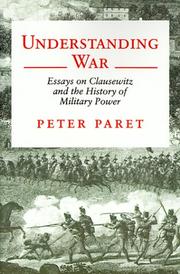| Listing 1 - 10 of 11 | << page >> |
Sort by
|
Book
Year: 1976 Publisher: Paris : Gallimard,
Abstract | Keywords | Export | Availability | Bookmark
 Loading...
Loading...Choose an application
- Reference Manager
- EndNote
- RefWorks (Direct export to RefWorks)
Book
Year: 1976 Publisher: Paris : Gallimard,
Abstract | Keywords | Export | Availability | Bookmark
 Loading...
Loading...Choose an application
- Reference Manager
- EndNote
- RefWorks (Direct export to RefWorks)

ISBN: 1403935874 Year: 2005 Publisher: Basingstoke Palgrave Macmillan
Abstract | Keywords | Export | Availability | Bookmark
 Loading...
Loading...Choose an application
- Reference Manager
- EndNote
- RefWorks (Direct export to RefWorks)
CLAUSEWITZ, CARL VON, 1780-1831 --- MILITARY ART AND SCIENCE --- WAR
Book
ISBN: 0198225040 Year: 1976 Publisher: Oxford : Clarendon press,
Abstract | Keywords | Export | Availability | Bookmark
 Loading...
Loading...Choose an application
- Reference Manager
- EndNote
- RefWorks (Direct export to RefWorks)
CLAUSEWITZ, CARL VON, 1780-1831--BIOGRAPHY --- STATE, THE --- WAR
Book
ISBN: 9780700616169 Year: 2008 Publisher: Lawrence, KA : University Press of Kansas,
Abstract | Keywords | Export | Availability | Bookmark
 Loading...
Loading...Choose an application
- Reference Manager
- EndNote
- RefWorks (Direct export to RefWorks)
CLAUSEWITZ, CARL VON, 1780-1831 --- WAR --- MILITARY ART AND SCIENCE
Book
ISBN: 9781849047142 Year: 2017 Publisher: London : Hurst,
Abstract | Keywords | Export | Availability | Bookmark
 Loading...
Loading...Choose an application
- Reference Manager
- EndNote
- RefWorks (Direct export to RefWorks)
This book offers an entirely new take on the work of history's greatest theorist of war. Written for an undergraduate readership that often struggles with Clausewitz's master work 'On War' - a book often considered too philosophical and impenetrably dense - it seeks to unpack some of Clausewitz's key insights on theory and strategy. In three fictional interludes Clausewitz attends a seminar at West Point; debates the War on Terror at a Washington think tank; and takes part in a heated discussion on the value of reading history at a meeting of the Military History Circle in London. Three separate essays situate Clausewitz in the context of his times, discuss his understanding of the culture of war, and explore the extent to which two other giants - Thucydides and Sun Tzu - complement his work.
CLAUSEWITZ, CARL VON, 1780-1831 --- MILITARY ART AND SCIENCE --- WAR

ISBN: 0691031991 0691000905 0691216037 Year: 1992 Publisher: Princeton (N.J.) Princeton University Press
Abstract | Keywords | Export | Availability | Bookmark
 Loading...
Loading...Choose an application
- Reference Manager
- EndNote
- RefWorks (Direct export to RefWorks)
WAR --- MILITARY ART AND SCIENCE--HISTORY --- CLAUSEWITZ, CARL VON, 1780-1831
Book
Year: 1996 Publisher: Washington : National Defense University,
Abstract | Keywords | Export | Availability | Bookmark
 Loading...
Loading...Choose an application
- Reference Manager
- EndNote
- RefWorks (Direct export to RefWorks)
CLAUSEWITZ, CARL VON, 1780-1831 --- WAR --- MILITARY ART AND SCIENCE--HISTORY
Book
ISBN: 9780415561662 9780203848647 9781136949753 9781136949791 9781136949807 9780415642040 Year: 2011 Publisher: Milton Park, Abingdon, Oxon [England] ;New York Routledge
Abstract | Keywords | Export | Availability | Bookmark
 Loading...
Loading...Choose an application
- Reference Manager
- EndNote
- RefWorks (Direct export to RefWorks)
Book
ISBN: 9780198799047 Year: 2018 Publisher: Oxford, UK : Oxford University Press,
Abstract | Keywords | Export | Availability | Bookmark
 Loading...
Loading...Choose an application
- Reference Manager
- EndNote
- RefWorks (Direct export to RefWorks)
Carl von Clausewitz has long been interpreted as the paradigmatic thinker of major interstate war. This book challenges this assumption by showing that Clausewitz was an ardent analyst of small war and integrated many aspects of his early writings on partisan warfare and people's war into his magnum opus, On War. It reconstructs Clausewitz's intellectual development by placing it in the context of his engagement with the political and philosophical currents of his own times - German Idealism, Romanticism, and Humanism. The central question to Clausewitz and his contemporaries faced was how to defend Prussia and Europe against Napoleon's expansionist strategy. On the one hand, the nationalization of war that had occurred as a result of the French revolution could be countered only by drawing the people into the defence of their own countries. On the other, this risked a descent into anarchy and unchecked terror, as the years 1793 and 1794 in France had shown. Throughout his life Clausewitz remained optimistic that the institution of the Prussian Landwehr could achieve both an effective defence of Prussia and a social and political integration of its citizens. Far from leaving behind his early advocacy of people's war, Clausewitz integrated it systematically into his mature theory of war. People's war was war in its existential form; it risked escalating into 'absolute war'. However, if the threat of defensive people's war had become a standard option of last resort in early-nineteenth century Europe, it could also function as a safeguard of the balance of power.
| Listing 1 - 10 of 11 | << page >> |
Sort by
|

 Search
Search Feedback
Feedback About UniCat
About UniCat  Help
Help News
News